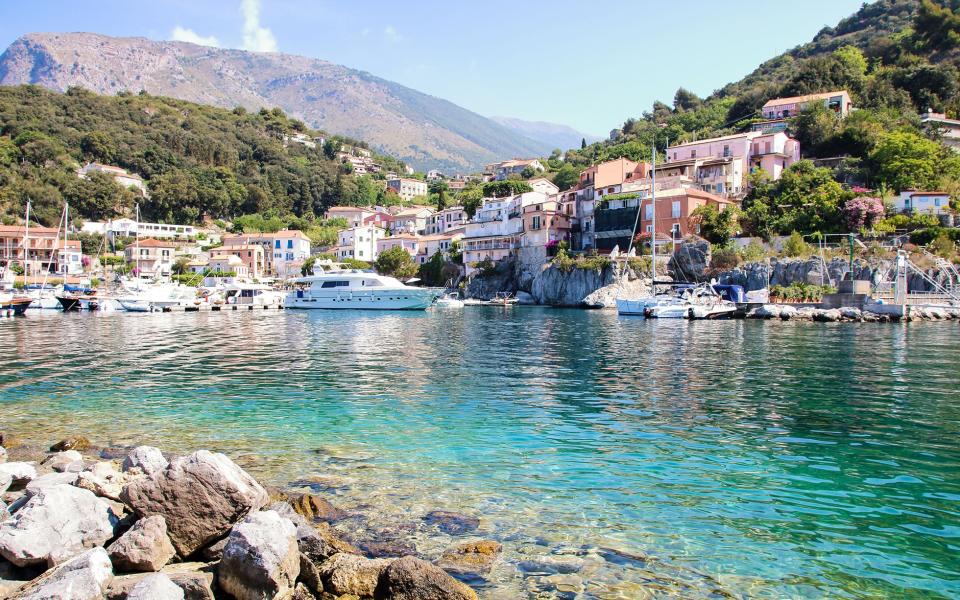'Not only unfair, but unnecessary': A postcard from Sicily, tarred with Italy's brush

It is sunrise. I am staying in the beach house – now a b&b – that is home to Inspector Montalbano in the Italian television series, and I want to get out on the terrace to take a photo before going for a swim. I walk down the marble staircase. At the end of the living room – instantly recognizable – I can see the famous white balustraded terrace and the sun flinking on the waves of the sea. But blocking my way is a bulky, heavy-jowelled, unshaven man.
I freeze. I can smell Paco Rabanne from here. If I can smell his aftershave then what on earth else am I breathing in? I can almost see little spiked viruses dancing through the air.
I am not usually so neurotic. But I have been travelling around Sicily for a month, and this is the first time I have seen anyone unmasked in a public room. Even in a remote mountain village reachable only by an un-made road, the old fellows smoking outside the bar had masks around their wrists and the frail faces of ladies in black queuing at the deli counter were almost invisible behind blue paper. Outdoors, in pavement cafés, on the glorious sandy beaches, hiking through gorges and up volcanoes life was just as it had always been and Covid felt a million miles away. But as soon as you stepped inside anywhere – bar, restaurant, hotel, shop from the most upscale boutique to the local branch of Lidl – absolutely everyone was wearing a mask.
Despite the blanket advice against non-essential travel to Italy announced yesterday, Coronavirus rates in Sicily remain almost miraculously low. While more 36,000 people have died of Covid in Italy, in Sicily the virus has killed just 346 people. The contagion rate in Sicily is 0.2 per cent; in Lombardy it is 1.1 per cent. Across the Straits of Messina from Sicily, in the southern regions of Basilicata and Calabria, the rates are even marginally lower, but there they do not have international airports or attract anything like the number of tourists – Italian and international – that Sicily does. When I asked Sicilians why they thought Covid rates in the South were so low, I had various replies. The sun, the sea, the outdoor life, the Mediterranean diet, olive oil, Nero d’Avola wine, the low consumption of processed foods.

• The countries you can actually visit now
But I think it’s something else. I brought my children up in Sicily, and was driven to distraction by the dirt, germ and weather phobias of the other mothers, the constant choruses of 'don’t run, you’ll get hot', 'don’t do that, you’ll get dirty', 'come inside, there’s a bad wind', and, once even 'don’t go onto the beach, there’s sand there.' Meanwhile, of course, my kids were running about bare-foot, bare-armed and, usually, liberally smeared with sand, seaweed and/or mud.
I was gung-ho about this at first, even privately accused the Sicilians of hypochondria. But slowly I realised where the paranoia came from. It is only recently that any degree of prosperity has come to Sicily, and if you are poor, with poor living conditions, you need to be careful to stay well. Tales of poverty and ill health from parents and grandparents have assured that the fear of disease and contagion remains hard-wired into the Sicilian psyche.
The island’s history – and folk traditions – are punctuated with legends of cities being saved from the plague by saints, celebrated to this day in colourful and heartfelt processions throughout the island. Though it might be far-fetched to suggest that there is a collective memory of the fact that the Black Death entered Europe through the Sicilian port of Messina, people have followed the rules for Covid in Sicily because they are scared of what will happen if they don’t.
Boris Johnson's contention that Italians are not a ‘freedom-loving people’ is not just untrue, but beside the point. Italians – and in particular Sicilians and Southern Italians – are hardly known for unthinking obedience to the law. Nor, more surprisingly, are they particularly health and safety aware – smoking rates are still high, and recent road death statistics showed that more than twice the number of people die on the road in Italy than in the UK. Asked why they refuse to wear a seatbelt, or use a wing mirror, the standard answer is often ‘well, if it’s my destiny to die, I will die’. That Covid has triggered a very different reaction is only proof that the fear of an unknown disease lies deep.
It seems, therefore, not only unfair, but unnecessary, for Sicily to have been tarred with the same brush as the rest of country. It is, after all, an island, making the regulation of traffic on and off far easier than in continental Italy. With rates far below that of most of Britain, and Covid tests now obligatory for anyone entering Italy, it should surely be possible to travel to Sicily from the UK without needing to quarantine on return. And if ever we were in need of winter sun, surely it is now.


